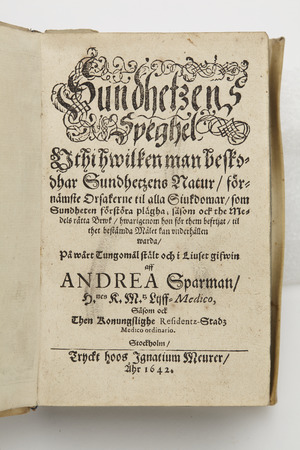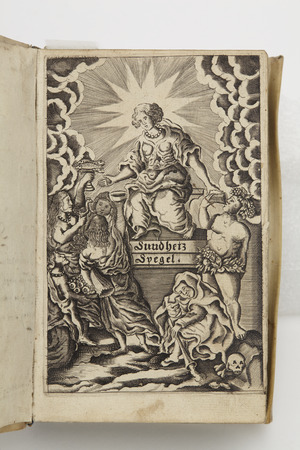Andreas Sparman facts for kids
Andreas Sparman (born 1609, died 1658) was an important Swedish doctor. He was also known as Andreas Palmcron. He worked as the personal physician for two Swedish rulers: Queen Christina and King Charles X Gustav.
Sparman is best known for his book, Sundhetzens Speghel. This book is considered one of the best medical books of its time. Some people even think it was the first Swedish cookbook.
Contents
Who Was Andreas Sparman?
Andreas Sparman was born in a place called Sparrsätra parish, in Uppsala County, Sweden. His original name was Andreas Schomerus. He later changed his name to Sparrman, named after his birthplace.
In 1647, he was honored and given the new name Palmcron. He passed away in Stockholm in 1658.
Andreas Sparman studied medicine in a city called Leiden, in the Netherlands. After he finished his studies, he came back to Sweden. He became the city doctor for Stockholm. Later, he became the personal doctor to the Swedish Queen Christina and King Charles X Gustav.
Andreas Sparman's Books
Andreas Sparman wrote several important books during his lifetime. These books helped people understand health and how to stay well.
Book About the Plague
In 1638, a serious sickness called the Plague was spreading. Sparman wrote a helpful book about it. It explained how to try and stop the disease from spreading. It also gave advice on how to treat people who were sick. This book was so useful that it was printed again in 1652 and 1710 when the plague returned.
Sundhetzens Speghel
In 1642, Sparman wrote his most famous book, Sundhetzens Speghel. The long title means "Mirror of Health, from which one may learn the nature of health, the principle causes of all diseases which chiefly undermine health, together with the remedies which deliver us from them".
This book is thought to be the best medical book of that century. It taught people how to stay healthy and avoid getting sick. It also talked about common diseases and how to treat them. His book also warned about things that could harm your health, like too much alcohol.
Other Writings
In 1652, there was another serious sickness called rödsots, or dysentery. Sparman wrote another book to help people prevent this illness.
He also worked on translating the hymns from the Psalms into Swedish. He was given permission to publish them, but they were never printed.
 | Isaac Myers |
 | D. Hamilton Jackson |
 | A. Philip Randolph |



